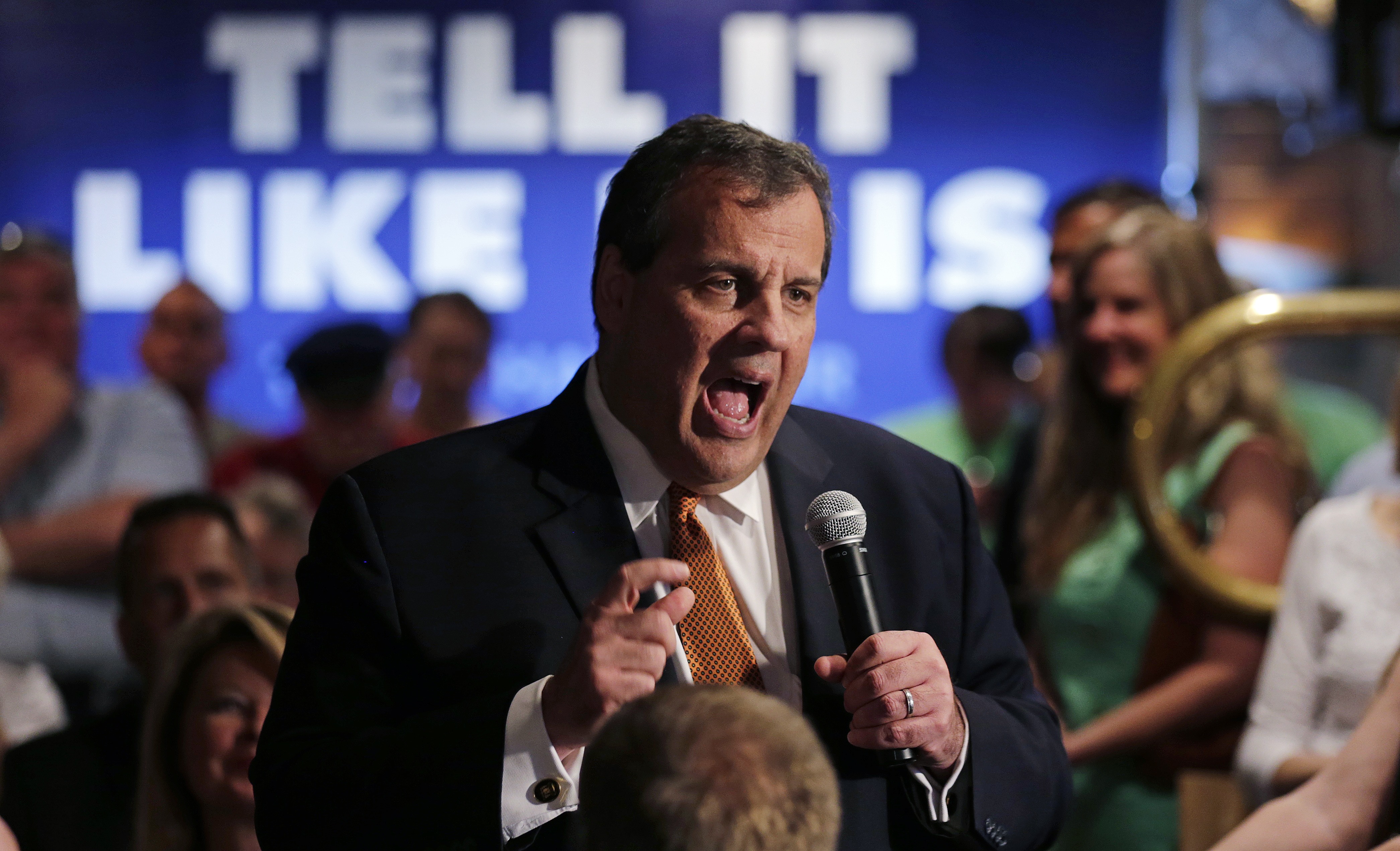Chris Christie promised to tell it like it is. Here's what that would actually sound like.
Spoiler alert: It would not be popular with GOP voters!


In his presidential campaign announcement Tuesday, the reliably brash and blunt Chris Christie vowed that "telling like it is" would be both his campaign motto and his promise to voters.
Even for Christie, whose entire political persona is based on no-nonsense candor, consistently "telling it like it is" is basically impossible. Can you imagine if the New Jersey governor — or any of the other Republican candidates — really told it like it is about the most important issues and challenges facing America? What would that even sound like? Well, maybe something like this:
"...and that's why I am announcing my candidacy for president of the United States! [Applause.] Thank you! Thank you! Now during my campaign, I'm going to tell it like it is. I'm going to let 'er rip! [Applause.] Hard truths need to be spoken, and I will speak them.
The Week
Escape your echo chamber. Get the facts behind the news, plus analysis from multiple perspectives.

Sign up for The Week's Free Newsletters
From our morning news briefing to a weekly Good News Newsletter, get the best of The Week delivered directly to your inbox.
From our morning news briefing to a weekly Good News Newsletter, get the best of The Week delivered directly to your inbox.
'What are these truths?' you ask. For starters, we Republicans are way too focused on President Obama. Trust me, I'll have a lot to say during this campaign about the president's mistakes. Heaven knows, there's been a lot of them. [Extended applause.] But he's gone in a year and half. [Extended applause.]
Here's the thing: The U.S. economy didn't run into trouble the day Barack Obama took the oath of office. Even before the Great Recession, there were signs something wasn't quite right. The economy grew by 4 percent annually and created 20 million new jobs during both the Reagan and Clinton booms. But in the [candidate makes air quotes] "Bush boom" of the 2000s, we couldn't even hit 3 percent growth. And we created only about seven million jobs. Income growth was also a lot slower. I could go on and on. Productivity growth has been terrible during Obama's Not-So-Great Recovery, but the slowdown started in 2006, when we had a Republican president. We've had problems with jobless recoveries and middle-income job lag since the early 1990s. Heck, the new business startup rate in this country has been falling for 30 years!
You can't blame ObamaCare or Dodd Frank for all that. [Confused murmurs from audience.] The truth is technological automation and global competition are presenting new challenges to American workers. To meet those challenges and to turn them into opportunities means embracing new approaches, not recycling old ones. Certainly tax reform is part of the answer. I mean, we're Republicans after all. Tax cuts are what we do. But you have to be savvy about cutting taxes when you're already $18 trillion in the red. You need to pick your spots and get the most bang for your buck, like tax cuts and credits that boost working-class incomes — a rising tide is not lifting all boats right now — and spur business investment.
You want to do deep, across-the-board tax cuts like President Reagan did? Fine. God bless you. But keep in mind that for every percentage point you cut from those tax rates, you lose about $70 billion a year in revenue. And don't expect to make up anywhere near that in economic growth. Even the Reagan tax cuts lost money, and the tax code was in far worse shape back then. [Unintelligible shouts from audience.] Heck, 40 percent of Americans don't even pay income taxes.
A free daily email with the biggest news stories of the day – and the best features from TheWeek.com
Oh, and while we're thinking about tax reform, keep in mind the federal tax burden will almost certainly need to rise in the future because we'll have a lot more old folks. [Booing.] And we'll have to pay for their pensions and healthcare. Smart entitlement and healthcare reform can reduce that tax increase — in that way it's like a future tax cut — but it's highly unlikely to eliminate it. Democrats need to accept that projected future benefits will need reduction, and Republicans need to accept a higher tax burden. [Extended booing.] Republicans should also be in favor of spending less money on rich people through tax breaks for homes and health insurance. [Several fist-shaking audience members stomp out.]
There's just too much short-term thinking in this country. I mean, I'm no scientist, but we are doing something new to our planet and it hardly seems crazy to take out some insurance against a worst-case outcome. [Boos continue, get louder.] Let's invest more in basic clean-energy research and remove regulatory barriers to more nuclear power. Maybe also eliminate the corporate income tax and replace it with a carbon tax. I note that even my friends on the Wall Street Journal editorial page said the other day that might be a good idea. And let's not let Corporate America off the hook here. Too much short-termism there, as well, not just in Washington. Too much cash being returned to investors rather than going to fund new investment and innovation.
Now turning to foreign policy... Wait, where did everybody go?"
James Pethokoukis is the DeWitt Wallace Fellow at the American Enterprise Institute where he runs the AEIdeas blog. He has also written for The New York Times, National Review, Commentary, The Weekly Standard, and other places.
-
 How robust is the rule of law in the US?
How robust is the rule of law in the US?In the Spotlight John Roberts says the Constitution is ‘unshaken,’ but tensions loom at the Supreme Court
-
 Magazine solutions - December 26-January 2
Magazine solutions - December 26-January 2Puzzles and Quizzes Issue - December 26-January 2
-
 Venezuela ‘turning over’ oil to US, Trump says
Venezuela ‘turning over’ oil to US, Trump saysSpeed Read This comes less than a week after Trump captured the country’s president
-
 Bari Weiss’ ‘60 Minutes’ scandal is about more than one report
Bari Weiss’ ‘60 Minutes’ scandal is about more than one reportIN THE SPOTLIGHT By blocking an approved segment on a controversial prison holding US deportees in El Salvador, the editor-in-chief of CBS News has become the main story
-
 Has Zohran Mamdani shown the Democrats how to win again?
Has Zohran Mamdani shown the Democrats how to win again?Today’s Big Question New York City mayoral election touted as victory for left-wing populists but moderate centrist wins elsewhere present more complex path for Democratic Party
-
 Millions turn out for anti-Trump ‘No Kings’ rallies
Millions turn out for anti-Trump ‘No Kings’ ralliesSpeed Read An estimated 7 million people participated, 2 million more than at the first ‘No Kings’ protest in June
-
 Ghislaine Maxwell: angling for a Trump pardon
Ghislaine Maxwell: angling for a Trump pardonTalking Point Convicted sex trafficker's testimony could shed new light on president's links to Jeffrey Epstein
-
 The last words and final moments of 40 presidents
The last words and final moments of 40 presidentsThe Explainer Some are eloquent quotes worthy of the holders of the highest office in the nation, and others... aren't
-
 The JFK files: the truth at last?
The JFK files: the truth at last?In The Spotlight More than 64,000 previously classified documents relating the 1963 assassination of John F. Kennedy have been released by the Trump administration
-
 'Seriously, not literally': how should the world take Donald Trump?
'Seriously, not literally': how should the world take Donald Trump?Today's big question White House rhetoric and reality look likely to become increasingly blurred
-
 Will Trump's 'madman' strategy pay off?
Will Trump's 'madman' strategy pay off?Today's Big Question Incoming US president likes to seem unpredictable but, this time round, world leaders could be wise to his playbook
